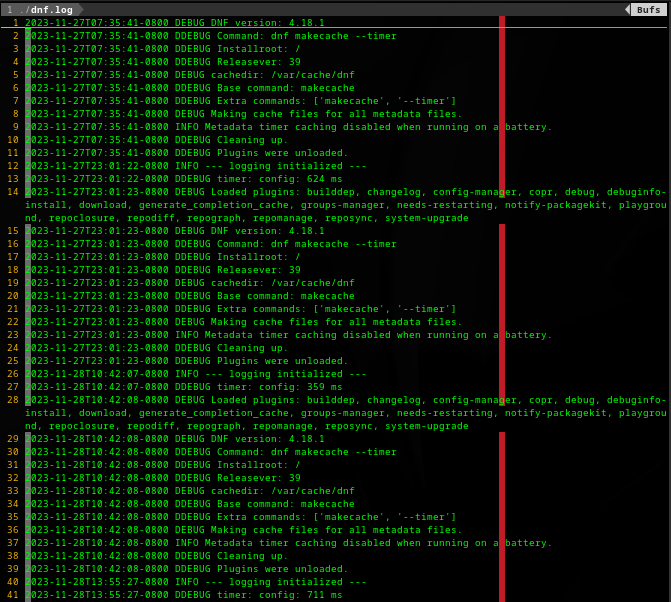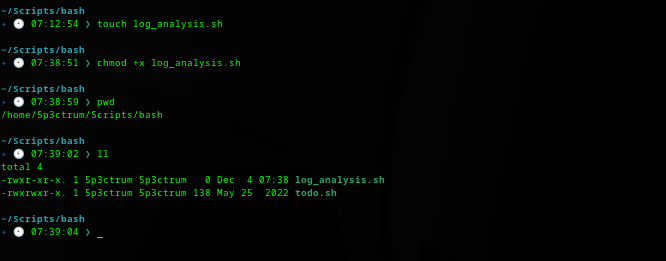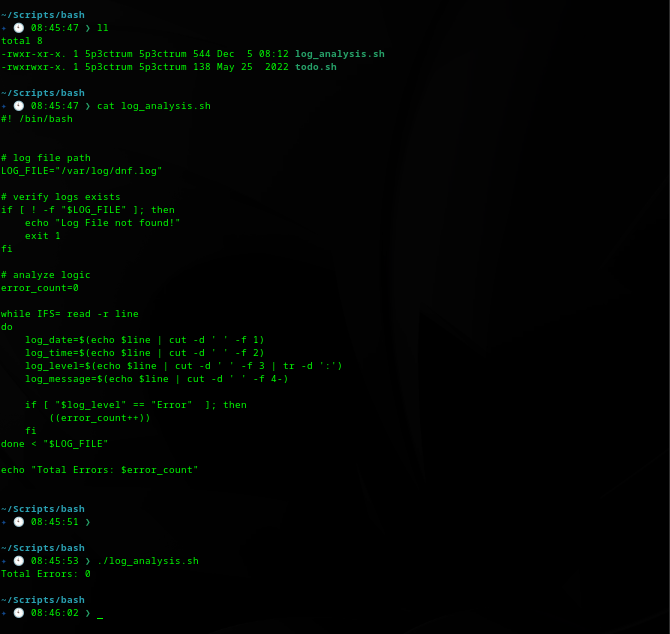Welcome to the journey through the realm of Linux system administration, where mastering the art of log file analysis becomes a pivotal skill. In this tutorial, we’ll delve into creating a Bash script tailored for CentOS 8, designed to read and process multiple system log files. Embrace the process of scripting as it unfolds the secrets hidden in logs from ‘/var/log/messages‘, ‘/var/log/secure‘, and more. Whether navigating the intricacies of ‘initV‘ or ‘Systemd‘, this guide stands as a beacon, illuminating the path to efficient log file analysis. Prepare to enhance system monitoring and troubleshooting capabilities, unlocking new levels of proficiency in Linux administration.
Learning Objective
In this comprehensive tutorial, we set out to equip budding Linux System Administrators with essential skills in log file analysis on CentOS 8. Our focused objectives include:
- Mastering Log File Reading: Gain proficiency in accessing and reading various system log files, including ‘/var/log/messages‘, ‘/var/log/secure‘, and more.
- Enhancing Parsing Skills: Develop the ability to effectively parse and extract key data from log entries, using standard text processing tools in Bash.
- Analyzing Log Content: Learn to analyze and interpret the information contained in log files, identifying critical events and patterns.
- Scripting for Different Systems: Understand the nuances of scripting for both ‘initV‘ and ‘Systemd‘ systems, ensuring adaptability across different Linux environments.
- Summarizing Log Data: Cultivate skills in summarizing log data, translating raw logs into meaningful insights for better system monitoring and troubleshooting.
This journey aims to transform theoretical knowledge into practical expertise, paving the way to becoming a proficient Linux System Administrator.
Technologies Used
Delve into the world of Linux system administration by harnessing a suite of powerful technologies and tools. Navigate through CentOS 8, a robust and widely-used Linux distribution, serving as the foundation for our scripting and log analysis exercises. Employ Bash, the default shell on CentOS, to craft versatile scripts capable of parsing and analyzing log data. Utilize standard Linux text processing utilities like grep, awk, sed, and cut to efficiently extract and manipulate information from log files. Embrace the functionalities of both ‘initV‘ and ‘Systemd‘, the init systems, to understand and adapt to different system environments. Through this exploration, solidify a strong command of essential tools, paving the way to mastery in Linux system administration.
Use Cases
Harness the capabilities of this tutorial to address a variety of practical and critical scenarios in Linux system administration. Utilize the skills and scripts developed here to:
- Monitor System Health: Regularly check system logs to preemptively identify and address issues, ensuring smooth and uninterrupted system performance.
- Enhance Security Measures: Analyze security logs, especially from /var/log/secure, to detect and respond to unauthorized access attempts or other security breaches.
- Troubleshoot System Issues: Quickly diagnose and resolve system errors or failures by parsing and understanding error logs from various system components.
- Optimize System Performance: Use insights gained from log analysis to fine-tune system settings, improving overall efficiency and performance.
- Audit System Activities: Maintain a comprehensive overview of system operations, facilitating compliance with audit requirements and internal policies.
Embrace these use cases to foster a proactive approach to system management, elevating the ability to maintain robust, secure, and efficient Linux environments.
Why This Matters
Grasp the significance of log file analysis in the realm of Linux system administration, recognizing its vital role in maintaining and securing systems. Acknowledge that, through this tutorial:
- Enhance Problem-Solving Skills: Develop the ability to quickly identify and resolve system issues, a crucial skill in ensuring high system availability and reliability.
- Bolster Security Posture: Gain insights into potential security vulnerabilities and breaches, a key aspect of safeguarding sensitive data and infrastructure.
- Improve System Insights: Acquire a deeper understanding of system operations and performance, enabling more informed decisions for system optimization.
- Empower Proactive Maintenance: Transition from reactive to proactive system management, anticipating issues before they escalate into critical problems.
- Build Professional Expertise: Elevate professional value and expertise in the field of Linux system administration, an ever-evolving and in-demand skill set.
Recognize the power of mastering log file analysis, a cornerstone skill that significantly contributes to the efficiency, security, and robustness of Linux systems.
What You Will Learn
Embark on a comprehensive learning experience designed to equip you with vital skills in Linux system administration. Throughout this tutorial, you will:
- Navigate CentOS 8: Familiarize yourself with this popular Linux distribution, understanding its structure and functionality.
- Master Bash Scripting: Develop proficiency in creating Bash scripts, a fundamental tool for automating tasks and log file analysis.
- Parse and Analyze Logs: Learn to effectively parse and extract meaningful information from various system log files.
- Utilize Text Processing Tools: Gain hands-on experience with tools like grep, awk, sed, and cut, essential for manipulating and interpreting log data.
- Understand Systemd and InitV: Explore the differences and applications of Systemd and initV, enhancing adaptability across different Linux environments.
- Apply Practical Use Cases: Translate your knowledge into practical applications, addressing real-world scenarios in system monitoring, troubleshooting, and security.
Prepare to transform theoretical knowledge into actionable skills, setting a strong foundation for advanced Linux system administration capabilities.
Real-World Application
Apply the skills and knowledge acquired from this tutorial to real-world scenarios in Linux system administration, effectively impacting various aspects of technology and business. Through this learning, you will:
- Optimize IT Infrastructure: Enhance the performance and reliability of Linux-based systems, a crucial component in modern IT environments.
- Strengthen Cybersecurity: Implement robust security measures by analyzing and responding to insights gleaned from security logs, a key practice in safeguarding digital assets.
- Facilitate Compliance and Auditing: Ensure adherence to compliance standards by maintaining detailed logs and audits, a necessity in regulated industries.
- Improve Incident Response: Accelerate response times to system failures or security breaches, minimizing downtime and protecting organizational reputation.
- Drive Data-Driven Decisions: Leverage log data to inform strategic decisions, contributing to improved system designs and technology strategies.
Embrace these applications to make a tangible impact in your role as a Linux System Administrator, enhancing both technical operations and strategic outcomes.
Let’s Get Started!
- Understanding Your Log File Format
- First, ensure you know the format of the log files. Suppose a log file entry on your CentOS 8 server looks like this:

- Creating Your Script
- Open a terminal and use the following commands to create a new Bash script:
- # touch log_analysis.sh
- # chmod +x log_analysis.sh
- # pwd
- # ll

- Script Basic Structures
- # vim log_analysis.sh
- Add the following to the script:
- #! /bin/bash – shebang bash script
- # log file path – define the LOG_FILE variable
- # verify logs exists
- if statement, check if variable exist. if log file exists, move to the analyze logic if not exit from the script
- # analyze logic
- while loop, loops through each entry to find ‘Error’ and counts the errors in the log file
- Here’s the full script below:

Summary
Conclude this comprehensive tutorial with a deepened understanding and practical proficiency in Linux system administration, particularly in log file analysis on CentOS 8. Throughout this journey, you have:
- Explored the intricacies of CentOS 8, laying a solid foundation for Linux administration.
- Mastered the art of Bash scripting, a critical skill for automating and streamlining system tasks.
- Learned to expertly parse and analyze various system log files, extracting vital information for system health and security.
- Gained proficiency in using essential text processing tools, enhancing your ability to manipulate and interpret log data effectively.
- Understood the nuances of both Systemd and initV systems, ensuring versatility in different Linux environments.
- Applied this knowledge to real-world scenarios, from optimizing system performance to enhancing cybersecurity measures.
Carry forward these skills to excel in Linux system administration, making a significant impact in technological and business landscapes.